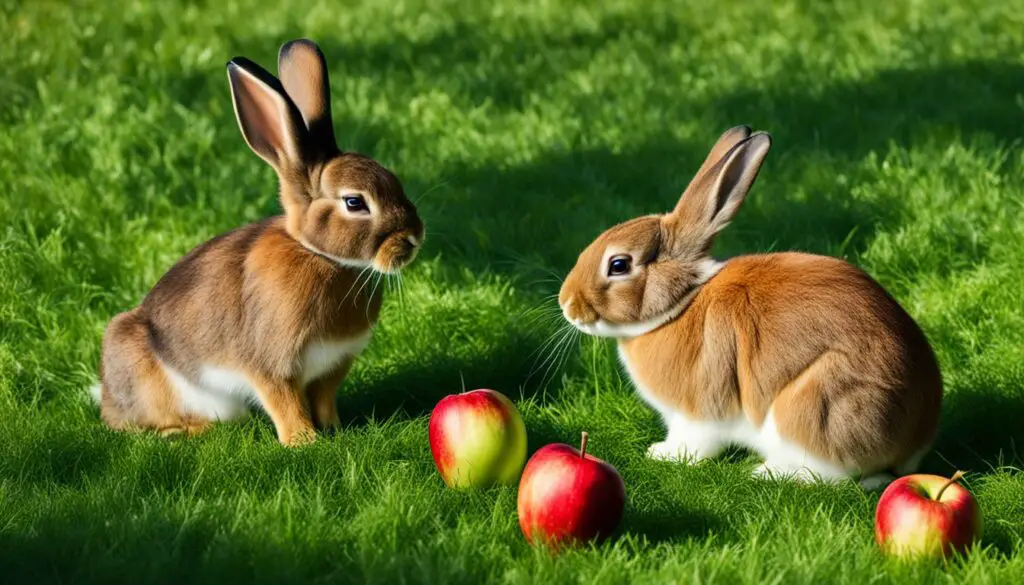As a pet owner, you may wonder if it’s safe to share your favorite fruits with your furry friend. If you have a rabbit, you might be curious about whether or not they can enjoy the delicious taste of apples. Well, I have good news for you! Rabbits can indeed eat apples, but there are a few things you should keep in mind to ensure their safety and well-being.
Before we dive into the details, let’s answer the burning question: can rabbits eat apples? The short answer is yes, but in moderation. Apples can be a healthy treat for rabbits when given occasionally. They offer a variety of vitamins and minerals that can complement their diet. However, it’s crucial to remember that apples should never replace their primary food sources of hay and fresh vegetables.
Key Takeaways:
- Rabbits can eat apples as an occasional treat.
- Apples provide vitamins and minerals that can benefit rabbits.
- Apples should not replace hay and fresh vegetables in a rabbit’s diet.
- Always cut the apples into small, bite-sized pieces and remove the core, seeds, and stem.
- Choose organic apples to minimize exposure to pesticides.
Nutritional Value of Green Apples for Rabbits
Green apples offer a range of nutritional benefits for rabbits. They are rich in essential vitamins and minerals that support their overall health. Green apples contain significant amounts of vitamin C, which is crucial for maintaining a strong immune system. Vitamin A, found in green apples, is essential for good eye health in rabbits. Additionally, green apples are a great source of phytonutrients that have antioxidant properties, helping to protect against cell damage.
When it comes to fiber and hydration, green apples are an excellent choice. They provide rabbits with dietary fiber, promoting healthy digestion and preventing gastrointestinal issues. The high water content in green apples also helps keep rabbits hydrated, ensuring their internal systems function properly. However, it’s important to note that green apples do contain sugars, so they should be given to rabbits in moderation and as an occasional treat.
In summary, green apples offer rabbits a range of beneficial nutrients, including vitamins, minerals, fiber, and hydration. However, their sugar content means they should be given in moderation. As part of a well-balanced diet, green apples can be a healthy and enjoyable treat for rabbits.
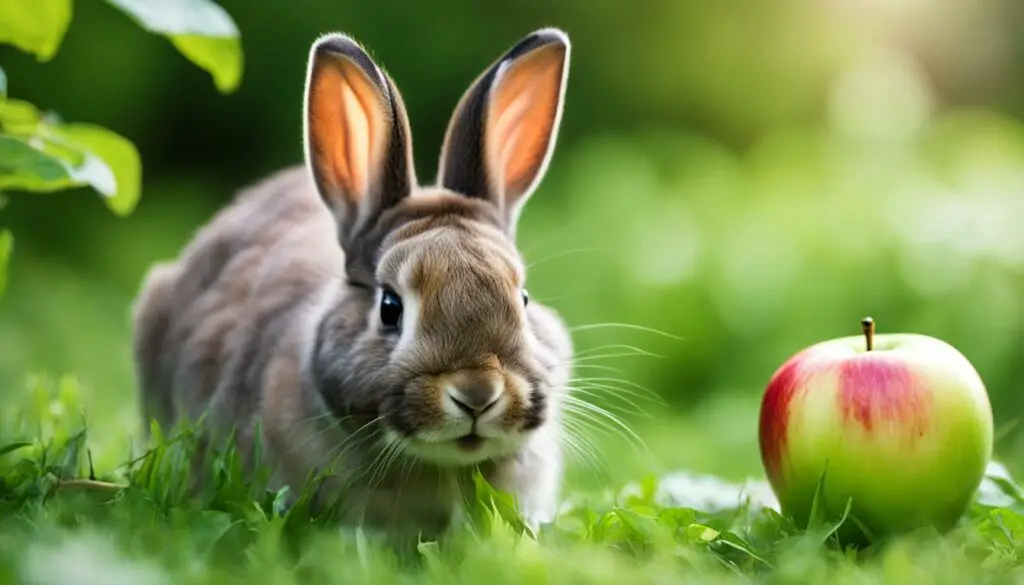
| Nutrient | Amount in Green Apples |
|---|---|
| Vitamin C | 10.3 mg |
| Vitamin A | 98 IU |
| Fiber | 2.4 g |
| Sugar | 9.3 g |
| Water | 85.6 g |
Benefits of Green Apples for Bunnies
Green apples offer several benefits for bunnies that make them a great addition to their diet. Here are some key advantages:
- High Fiber: Green apples are rich in dietary fiber, which plays a crucial role in promoting healthy digestion in bunnies. Fiber helps regulate bowel movements, prevent constipation, and maintain optimal gut health.
- Hydration: Green apples have a high water content, making them a hydrating snack for rabbits. Proper hydration is essential for supporting various bodily functions and preventing issues like urinary tract problems.
- Low Calorie: Green apples are relatively low in calories, making them an ideal choice for rabbits that need to watch their weight or are on a controlled diet. They can enjoy the tasty treat without adding excessive calories to their daily intake.
“Green apples provide bunnies with essential fiber for healthy digestion, hydration to support overall well-being, and a low-calorie snack option.”
Promoting Healthy Digestion in Bunnies
One of the primary benefits of green apples for bunnies is their ability to promote healthy digestion. The high fiber content in green apples helps regulate the digestive system and prevent gastrointestinal issues, such as diarrhea and bloating. The fiber acts as a natural scrub brush, aiding in the removal of hairballs and other indigestible material from the rabbit’s digestive tract. By including green apples in their diet, bunnies can maintain a healthy and efficient digestive system.
Table: Nutritional Comparison of Green Apples and Other Fruits
| Fruit | Fiber (g) | Sugar (g) | Water Content (%) |
|---|---|---|---|
| Green Apple | 4.4 | 9.3 | 84 |
| Strawberries | 2 | 4.9 | 91 |
| Blueberries | 2.4 | 9.7 | 85 |
| Bananas | 2.6 | 17.2 | 74 |
| Pineapple | 1.4 | 16 | 86 |
Note: The nutritional values may vary depending on the specific variety and ripeness of the fruit.
As shown in the table, green apples have a higher fiber content compared to some other fruits like strawberries, blueberries, bananas, and pineapples. This high fiber content contributes to better digestion in bunnies and helps maintain their overall gut health. While green apples contain some sugar, their water content and fiber help mitigate the impact on blood sugar levels, making them a suitable low glycemic snack option for bunnies.
Are Green Apples Safe for Rabbits?
When it comes to feeding green apples to rabbits, it’s important to consider their safety and potential risks. While green apples can be a tasty and nutritious treat for rabbits, there are a few factors to keep in mind.
Firstly, the firm texture of green apples can pose a choking hazard for rabbits. It is crucial to ensure that the apples are cut into small, bite-sized pieces before offering them to your furry friends. This will help prevent any potential choking incidents and make it easier for rabbits to chew and digest.
Another aspect to consider is the sugar content of green apples. While they are lower in sugar compared to some other fruits, it’s still important to remember that rabbits have sensitive digestive systems. Consuming excessive amounts of apples can lead to diarrhea or an upset stomach. Therefore, it’s best to offer green apples as an occasional treat and in moderation.
In addition, it is advisable to choose organic green apples whenever possible. Conventionally grown apples may contain pesticides and other contaminants that can be harmful to rabbits. By opting for organic varieties, you can minimize the risk of exposing your rabbits to potentially harmful substances.
| Factors to Consider | Recommendations |
|---|---|
| Choking Hazard | Cut green apples into small, bite-sized pieces |
| Sugar Content | Offer green apples in moderation as an occasional treat |
| Pesticides and Contaminants | Choose organic green apples to minimize exposure |
| Potential Digestive Issues | Monitor your rabbits for any signs of diarrhea or upset stomach and adjust their apple intake accordingly |
Overall, when feeding green apples to rabbits, it’s important to prioritize their safety and well-being. By following these recommendations and being mindful of the potential risks, you can safely incorporate green apples into your rabbits’ diet as a delicious and nutritious treat.
How Much Green Apple Can Bunnies Eat?
When it comes to feeding green apples to bunnies, moderation is key. While rabbits can enjoy the occasional treat of green apples, it’s important to offer them in small portions. A recommended serving size for bunnies is approximately one to two small slices of a green apple. It’s essential to introduce green apples gradually into the bunny’s diet and monitor their response. Some bunnies may have sensitive stomachs, so it’s always a good idea to consult with a veterinarian before making any significant changes to their diet.
Feeding green apples to rabbits too frequently or in large quantities can lead to digestive upset and diarrhea. Green apples should be given to rabbits as an occasional treat, not as a regular part of their diet. Ideally, rabbits should have green apples no more than once or twice a week to avoid any potential digestive issues. It’s important to remember that treats should only make up a small portion of a rabbit’s diet, with the majority coming from hay and fresh vegetables.
By offering green apples in appropriate serving sizes and frequency, you can provide your furry friend with a tasty and healthy treat. Just remember to cut the apples into small, bite-sized pieces and remove the core, seeds, and stem before feeding them to rabbits. Monitoring your bunny’s response to green apples and ensuring a balanced diet will help keep them happy and healthy.
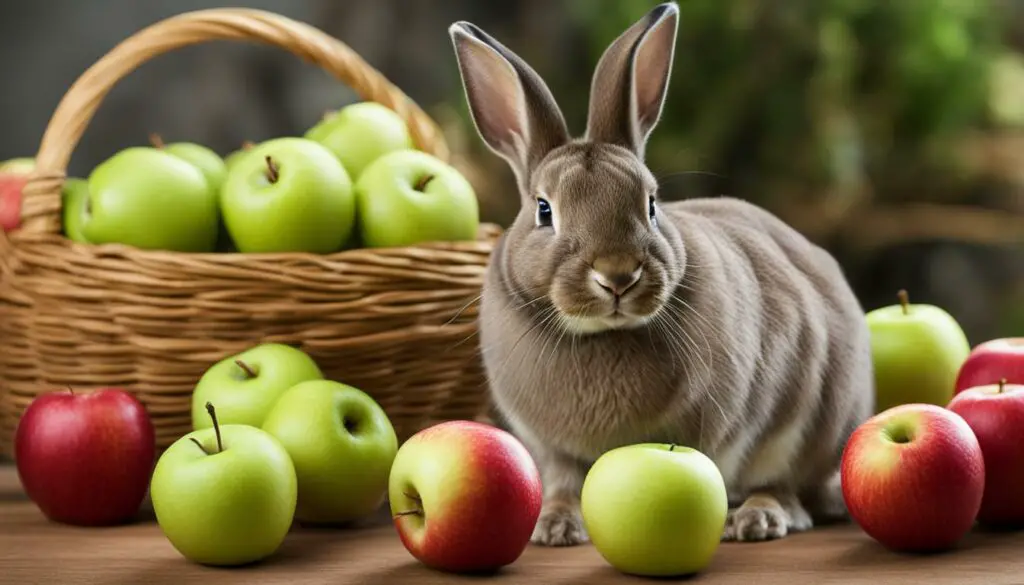
| Rabbit Size | Recommended Serving Size | Ideal Frequency |
|---|---|---|
| Small (2-4 pounds) | 1 small slice | Once or twice a week |
| Medium (4-6 pounds) | 1-2 small slices | Once or twice a week |
| Large (6+ pounds) | 2 small slices | Once or twice a week |
How to Prepare Green Apples for Bunnies
When it comes to feeding green apples to bunnies, proper preparation is key to ensure their safety and enjoyment. Here are some important steps to follow:
Washing and Cleaning Green Apples
To remove any dirt or potential pesticide residue, it’s essential to wash and clean green apples thoroughly before feeding them to your bunnies. Simply rinse the apples under cool running water and gently rub the surface to ensure all contaminants are removed. It’s always best to choose organic apples whenever possible to minimize exposure to harmful chemicals.
Removing Pesticides
If you’re concerned about pesticide residues, you can soak the green apples in a solution of 1 part vinegar to 3 parts water for 10-15 minutes. This can help remove any lingering pesticides before offering the apples to your bunnies. Rinse the apples thoroughly after soaking them to ensure any vinegar residue is removed.
Cutting Green Apples into Bunny-Sized Pieces
It’s important to cut green apples into small, bunny-sized pieces to avoid choking hazards and ensure easy chewing and swallowing. Rabbits have sensitive digestive systems, so cutting the apples into small, bite-sized pieces will make it easier for them to enjoy this tasty treat. Remember to remove the core, seeds, and stem before offering the apples to your bunnies.
By following these steps, you can safely and responsibly prepare green apples for your bunnies to enjoy as an occasional treat. Remember to always feed apples in moderation and consult with a veterinarian if you have any concerns about your bunny’s diet or health.
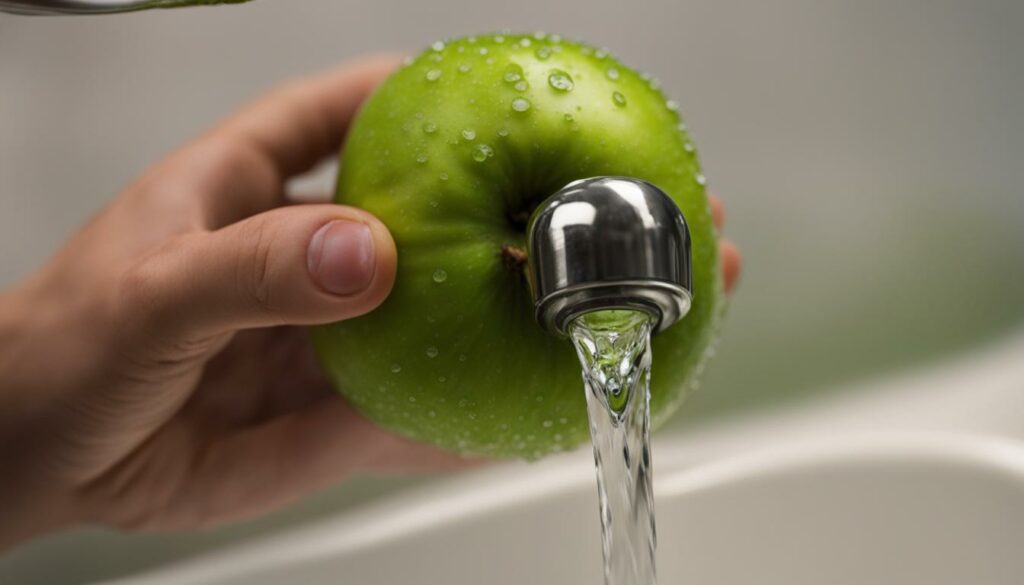
Can Rabbits Eat Apples? Evidence-Based Do’s and Don’ts
When it comes to feeding rabbits, it’s important to offer them safe and healthy treats. Apples can be a delicious option for bunnies, but there are a few things to keep in mind to ensure their well-being. Let’s explore the do’s and don’ts of feeding apples to rabbits.
Avoiding Choking Hazards
Rabbits have delicate digestive systems, so it’s crucial to prevent any choking hazards when feeding them apples. Always cut the apples into small, bite-sized pieces to make it easier for rabbits to chew and swallow. This minimizes the risk of choking and ensures they can enjoy their treat safely.
Dangers of Apple Seeds
While the flesh, peel, and stems of apples are safe for rabbits to eat, it’s essential to remove the core and seeds. Apple seeds contain a compound that can turn into a toxin called cyanide when digested. Although the levels of cyanide in apple seeds are generally low and unlikely to harm rabbits, it’s best to play it safe and avoid them altogether.
Sugar Content in Apples
Apples contain natural sugars, which makes them tasty for rabbits. However, it’s important to remember that too much sugar can lead to digestive upset and weight gain. Limit the amount of apples given to rabbits and make sure they are part of a balanced diet that consists primarily of hay and fresh vegetables. Moderation is key when it comes to feeding apples to your furry friends.

| Do’s | Don’ts |
|---|---|
|
|
Apple Tree Leaves as Rabbit Treats: Benefits and Risks
When it comes to treating your rabbit to something special, apple tree leaves can be a nutritious option. These leaves are packed with fiber and essential nutrients that can contribute to your rabbit’s overall health. They provide vitamins and minerals that support their immune system, digestion, and overall well-being.
However, it’s crucial to be aware of potential risks associated with apple tree leaves. Like many other plants, apple trees may be treated with pesticides, which can pose a risk to your rabbit’s health. Therefore, it’s important to only offer organic leaves that have been thoroughly washed to minimize exposure to harmful chemicals.
Another factor to consider is the sugar content in apple tree leaves. While they offer nutritional benefits, they also contain natural sugars. Too much sugar can lead to digestive issues and weight gain in rabbits, so it’s vital to offer apple tree leaves in moderation as part of a balanced diet.
| Benefits of Apple Tree Leaves for Rabbits | Risks of Apple Tree Leaves for Rabbits |
|---|---|
|
|
Always keep in mind that apple tree leaves should be offered as a treat, alongside a diet consisting primarily of hay and fresh vegetables. Monitor your rabbit’s response to apple tree leaves, and consult with a veterinarian for personalized guidance on your rabbit’s diet.
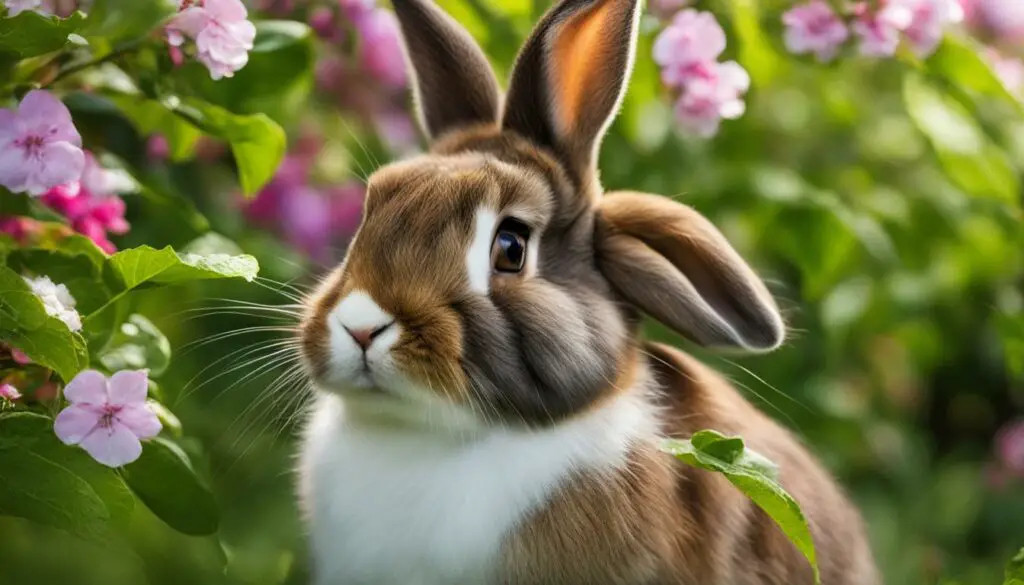
Expert Tip:
“When feeding apple tree leaves to your rabbit, make sure to only offer organic leaves that have been thoroughly washed to remove any pesticides. Remember to provide a balanced diet and offer treats in moderation to maintain your rabbit’s health.”
Incorporating Apples into a Healthy Diet for Pet Rabbits
Adding variety to a rabbit’s diet is essential to ensure they receive a well-balanced nutrition. While apples can be a tasty and nutritious treat for rabbits, it’s important to feed them in moderation and as part of a balanced diet. Apples should never replace their primary food sources of hay and fresh vegetables.
Rabbits thrive on a diverse diet, so incorporating apples as an occasional treat can provide some variety. However, it’s important to remember that treats should only make up a small portion of a rabbit’s overall diet. Too many apples can lead to an imbalance in their nutrition and potentially cause digestive issues.
To maintain a balanced diet for rabbits, it’s best to introduce apples gradually and in small quantities. Start by offering a small piece of apple and observe how your rabbit responds. If they tolerate it well, you can gradually increase the portion size. It’s also important to monitor your rabbit’s weight and overall health to ensure they are not consuming too many sugary treats.
Benefits of Incorporating Apples into a Rabbit’s Diet
While it’s crucial to practice moderation, there are some benefits to incorporating apples into a rabbit’s diet. Apples provide essential vitamins and minerals, including vitamin A, vitamin C, and potassium. These nutrients support overall health, including immune function and eye health. However, it’s important to note that apples should be offered without the core, seeds, and stem, as they can pose a choking hazard and contain small amounts of cyanide.
| Benefits of Incorporating Apples into a Rabbit’s Diet: |
|---|
| Provides essential vitamins and minerals |
| Supports immune function and eye health |
| Offers variety and enrichment |
By incorporating apples into a rabbit’s diet in moderation, you can provide them with a tasty treat that adds variety and enrichment. Just remember to always wash the apples thoroughly to remove any potential pesticides and cut them into small, bite-sized pieces to prevent choking hazards. With careful consideration and moderation, apples can be a healthy addition to a rabbit’s diet.
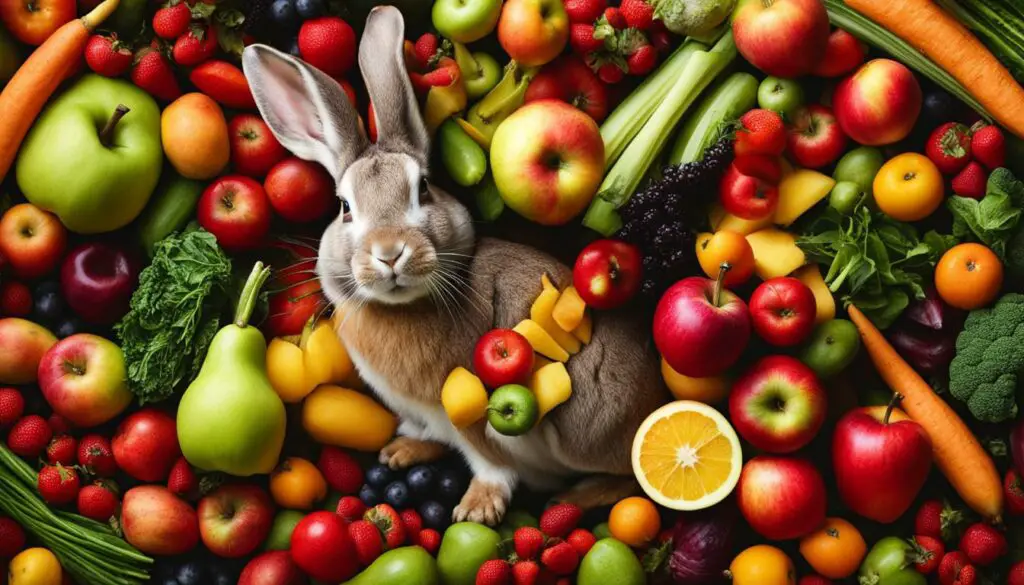
Exploring the Nutritional Benefits of Apples for Rabbits
Apples offer a range of nutritional benefits for rabbits, making them a healthy addition to their diet. One key advantage is the dietary fiber content in apples. Fiber is essential for maintaining a healthy digestive system in rabbits and can help prevent gastrointestinal issues. Additionally, apples contain essential vitamins and minerals that support overall health. These include vitamin C, which boosts the immune system, and various minerals that contribute to optimal body functioning.
Another advantage of apples is their rich antioxidant content. Antioxidants help protect the body against harmful free radicals that can cause cellular damage and contribute to aging and disease. By including apples in their diet, rabbits can enjoy the benefits of these natural antioxidants.
When considering the sugar content in apples, moderation is key. While apples do contain natural sugars, they are generally safe for rabbits when given in appropriate amounts. It’s important to remember that treats, including apples, should only make up a small portion of a rabbit’s diet. The primary sources of nutrition should consist of hay, fresh vegetables, and a small amount of pellets. By offering apples as part of a balanced diet, rabbits can enjoy their nutritional benefits without experiencing any negative effects from excess sugar consumption.
| Nutrient | Amount per 100g |
|---|---|
| Fiber | 2.4g |
| Vitamin C | 0.5mg |
| Vitamin A | 3mcg |
| Potassium | 107mg |
Table: Nutritional Content of Apples (per 100g)
Overall, including apples in a rabbit’s diet can contribute to their overall health and well-being. The dietary fiber, vitamins, minerals, and antioxidants found in apples provide valuable nutritional support. However, it’s important to offer them in moderation and alongside a balanced diet. By doing so, rabbits can enjoy the nutritional benefits of apples without any negative effects.
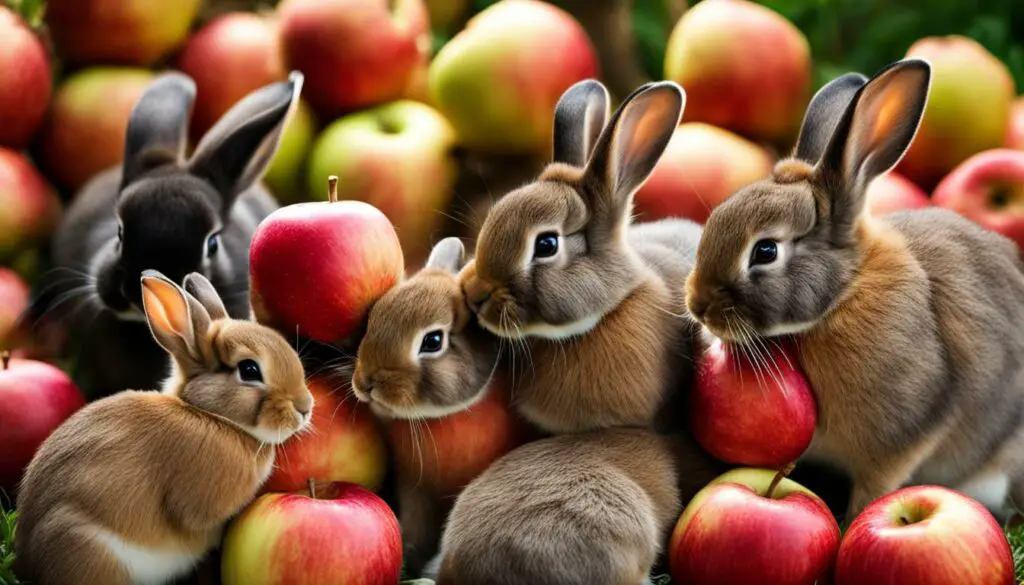
Additional Resources:
“Including apples in a rabbit’s diet can provide valuable nutrients and antioxidants. Just remember to offer them in moderation and alongside a balanced diet.”
Tips for Feeding Apples to Rabbits Safely and Responsibly
Introducing apples to your rabbit’s diet can be a tasty and nutritious addition, but it’s important to do so safely and responsibly. Here are some tips to ensure your rabbit enjoys apples without any negative consequences.
Introduce Apples Slowly
When adding apples to your rabbit’s diet, it’s best to start slow. Begin by offering a small piece and monitor your rabbit’s response. Some rabbits may have sensitive stomachs, so it’s important to introduce new foods gradually. If your rabbit tolerates the apple well, you can gradually increase the portion size over time.
Monitor Your Rabbit’s Response
As with any new food, it’s crucial to pay attention to how your rabbit reacts to apples. Watch for any signs of gastrointestinal upset such as diarrhea or changes in appetite. If you notice any adverse effects, it may be best to discontinue feeding apples and consult with a veterinarian.
Peel Apples for Rabbits
To minimize exposure to potential pesticides or contaminants, it’s recommended to peel the skin off apples before feeding them to rabbits. While washing the apples is important, peeling them can provide an extra layer of safety. Additionally, removing the skin can also help prevent any choking hazards, especially in smaller rabbits.
Remove Core and Seeds
Before offering apples to your rabbit, make sure to remove the core and seeds. Apple seeds contain trace amounts of cyanide and can be potentially harmful if ingested in large quantities. It’s best to err on the side of caution and remove them entirely before offering the apple to your rabbit.
Wash Apples Thoroughly
Prior to feeding apples to your rabbit, it’s crucial to wash them thoroughly. This helps remove any dirt, pesticides, or contaminants that may be present on the surface. Be sure to rinse the apples under cool running water, gently scrubbing to ensure a thorough cleaning.
By following these tips, you can safely and responsibly incorporate apples into your rabbit’s diet. Remember to always offer treats in moderation and ensure that the majority of your rabbit’s diet consists of hay and fresh vegetables. With the right approach, your furry friend can enjoy the occasional sweet and crunchy apple slice!
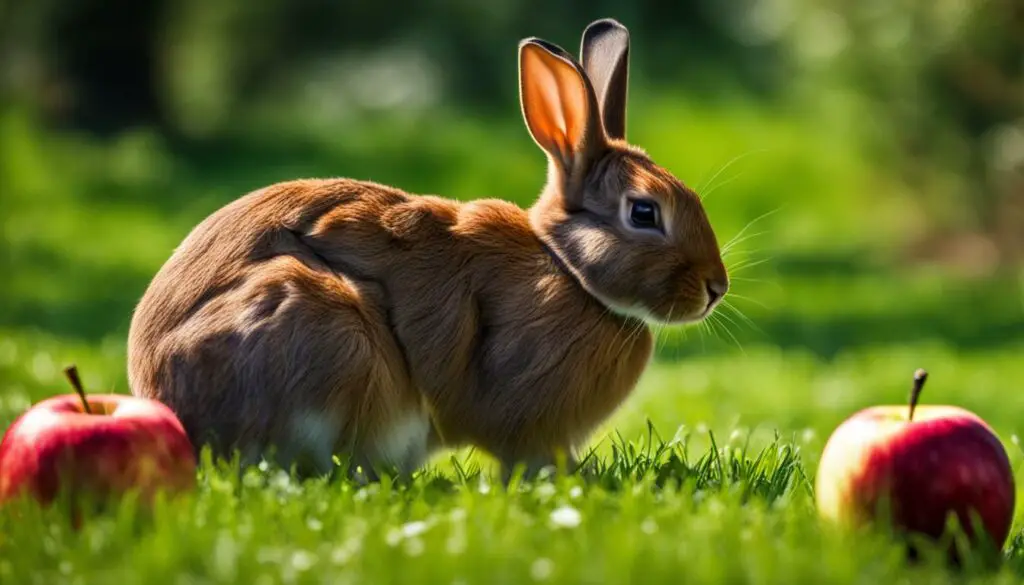
| Tips for Feeding Apples to Rabbits Safely and Responsibly |
|---|
| Introduce Apples Slowly |
| Monitor Your Rabbit’s Response |
| Peel Apples for Rabbits |
| Remove Core and Seeds |
| Wash Apples Thoroughly |
Conclusion
In conclusion, rabbits can enjoy apples as a healthy treat, but it’s important to feed them in moderation. Apples provide valuable nutrients like fiber, vitamins, and minerals, making them a beneficial addition to a rabbit’s diet. However, it’s crucial not to replace their main food sources of hay and fresh vegetables with apples.
When offering apples to rabbits, remember to cut them into small, bite-sized pieces and remove the core, seeds, and stem. Washing the apples thoroughly and choosing organic varieties can help reduce the risk of pesticide exposure. It’s also essential to monitor your rabbit’s response to apples and introduce them gradually into their diet.
While apples are generally safe for rabbits, it’s important to remember that they contain sugars that can cause digestive upset if consumed excessively. To maintain a balanced diet for your rabbit, offer apples as an occasional treat and focus primarily on providing a variety of hay and fresh vegetables.
If you have any concerns or questions about feeding apples to your rabbit, it’s always best to consult with a veterinarian. They can provide personalized guidance based on your rabbit’s specific needs and help ensure that they are receiving a healthy and well-balanced diet.
FAQ
Can rabbits eat green apples?
Yes, rabbits can eat green apples in moderation as an occasional treat.
What vitamins and minerals do green apples provide for rabbits?
Green apples are a good source of vitamin C, vitamin A, and potassium.
Are green apples safe for rabbits to eat?
While green apples are generally safe for rabbits, they should be cut into small, bite-sized pieces and the core, seeds, and stem should be removed.
How much green apple can bunnies eat?
Bunnies should have green apples no more than once or twice a week, and the serving size should be approximately one to two small slices.
How should green apples be prepared before feeding them to rabbits?
Green apples should be washed thoroughly to remove any pesticides or dirt, and they should be cut into bunny-sized pieces.
Can rabbits eat apple tree leaves?
Yes, apple tree leaves can be a beneficial treat for rabbits, but they should be given in moderation and only organic leaves should be used.
How should apples be incorporated into a rabbit’s diet?
Apples should be given as an occasional treat and not replace the primary food sources of hay and fresh vegetables.
What are the nutritional benefits of apples for rabbits?
Apples provide dietary fiber, vitamins, and minerals that support overall health in rabbits.
How should apples be fed to rabbits safely and responsibly?
Apples should be introduced slowly, the rabbit’s response should be monitored, and the apples should be washed, peeled, and the core and seeds should be removed before feeding them to rabbits.

